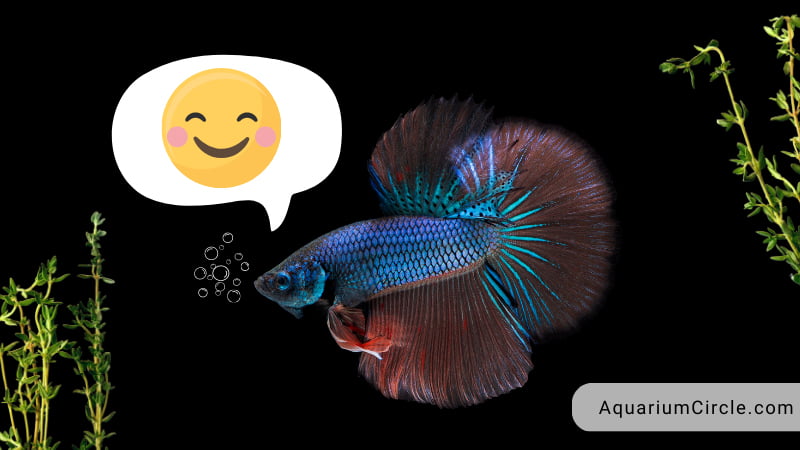Betta fish, also known as Siamese fighting fish, are one of the most popular aquarium fish species in the world. They are known for their striking colors and long, flowing fins, and are often kept as pets in homes and offices. As a betta fish owner, it’s important to ensure that your fish is healthy and happy in its environment.
In this article, we will discuss how to tell if your betta fish is happy and what you can do to keep it that way. By following the tips and guidelines outlined in this article, you can provide your betta fish with a comfortable and thriving environment that will help it live its best life.
See also:
- Healthy Betta Fish Vs Unhealthy: 9 Signs You Must Notice Before Your Pet Dies
- Do Betta Fish Sleep? Exact Answer For Bettas Sleeping Patterns And Habits
- Why Do Betta Fish Fight? 8 Reasons Behind The Aggression Of These Beautiful Swimmers
What Is A Normal Betta Fish Behavior?
A normal betta fish behavior includes active swimming, exploring their environment, flaring their fins and gills occasionally, and building bubble nests. Betta are curious and intelligent fish, and they enjoy interacting with their environment and even with their owners.
However, they may also spend some time resting on the bottom of the tank or in plants, which is perfectly normal behavior for them. Bettas are solitary creatures and prefer to live alone in their own tank, so it is important to avoid overcrowding or adding other fish to the tank. Overall, a healthy betta may display a variety of behaviors and will be active and curious when it is happy and comfortable in its environment.
How To Tell If Your Betta Fish Is Happy?
Remember, a healthy betta fish is a happy one! Although there is no concrete scientific evidence that explains what bettas can feel, we can infer from their behavior in their enclosure to gain some insight into their emotional state.
Active and energetic swimming
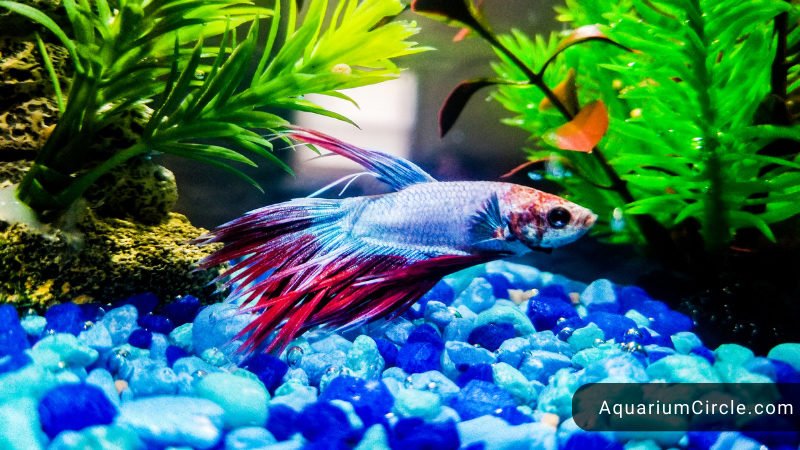
Bettas are naturally active and curious fish, and they will spend most of their time exploring their environment, swimming around plants, and interacting with their surroundings. You will know a betta is happy if it swim energetically and gracefully, darting around the tank and showing off its agility.
Bright and Vibrant Colors: Bettas are known for their striking colors, and a healthy and happy betta will display vivid and bright hues. A dull or faded coloration can indicate a stressed or sick betta, so it’s important to monitor your fish’s appearance regularly.
They’re not hiding away
A betta fish that is not hiding and can be easily spotted in the fish tank is another indication of a content and cheerful fish. If you find it difficult to locate your betta because it constantly hides, it could be a sign of stress or illness. While bettas do enjoy spending time in hiding spots such as ornaments, they should not spend all their time in them and ignore the rest of the tank.
Healthy appetite
A happy betta will have a healthy appetite and will eagerly eat its food when it is feeding time. Bettas are carnivores, and they require a protein-rich diet to stay healthy and active. Overfeeding can lead to health problems and a dirty tank, so it’s important to feed your betta small amounts of food 2-3 times a day.
Flaring fins and gills
Flaring is a natural behavior for bettas, and they will flare their fins and gills to display aggression, dominance, or to show off their beauty and strength. A happy betta will occasionally flare its fins and gills, but it should not do so excessively or constantly, as this can indicate stress or aggression.
Building bubble nests
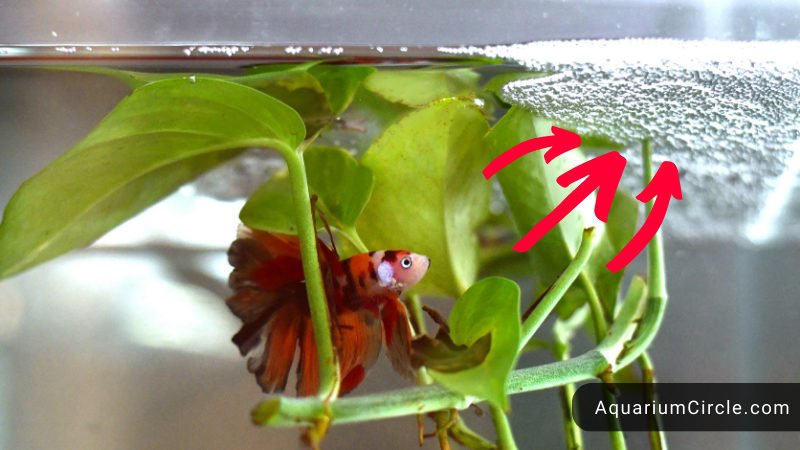
Male betta fish will build bubble nests at the surface of the water when they are ready to breed or when they feel content and comfortable in their environment. A bubble nest is a sign of a healthy and happy betta, as it indicates that the fish feels safe and secure in its surroundings.
See also: How To Breed Betta Fish At Home? Detailed Step-by-step Guide For You
Having a good rapport with their tank mates
When keeping bettas with other compatible fish, observing non-aggressive interactions with their tank mates is an encouraging sign. If your betta swims around or past other fish without appearing stressed or chasing them, it is a positive indication. However, if your betta is constantly flaring its fins, chasing and nipping at other fish, it suggests unhappiness, and it may be necessary to remove the other fish from the tank.
Do Betta Fish Get Depressed?
Betta fish do not experience emotions in the same way that humans do, so it’s not accurate to say that they can get depressed in the same sense.
However, betta fish can experience stress and display behaviors that indicate they are not content or comfortable in their environment.
These behaviors can include lethargy, loss of appetite, dull or faded coloration, and hiding all the time… that will be mentioned right at the following part.
Signs of an unhappy Betta fish
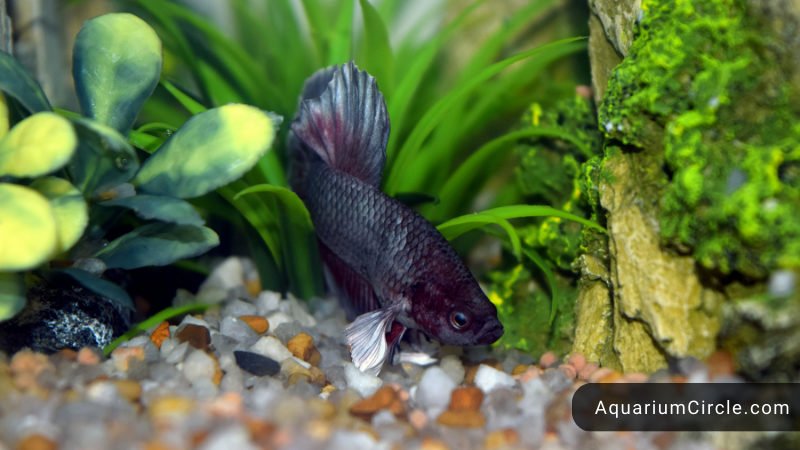
- Lethargic and Inactive Swimming: An unhappy Betta fish will swim less frequently and with less energy than usual. It may appear sluggish and lethargic, and may not respond to stimulation or play.
- Faded or Dull Coloration: A Betta fish that is unhappy or stressed may display faded or dull colors, indicating that it is not healthy. This can be caused by poor water quality, inadequate nutrition, or illness.
- Loss of Appetite: An unhappy Betta fish may refuse to eat or show a decreased appetite, which can be a sign of illness, stress, or poor water quality.
- Clamped Fins: Clamping their fins close to their body is a defensive posture that indicates an unhappy or stressed Betta fish. This can be caused by poor water quality, inadequate nutrition, or illness.
- Resting on the Bottom of the Tank: An unhappy Betta fish may spend extended periods resting on the bottom of the tank, indicating that it is not feeling well or is under stress. This can be caused by poor water quality, illness, or inadequate hiding spots.
- Excessive Hiding: While Betta fish enjoy having hiding spots, excessive hiding can indicate stress or discomfort in their environment. This can be caused by poor water quality, inadequate hiding spots, or overstimulation.
- Aggression: If a Betta fish displays aggression towards other fish or its owner, it may be a sign that it is feeling threatened or unhappy in its environment. This can be caused by overcrowding, inadequate hiding spots, or incompatible tank mates.
See also: Why Betta Fish Staying At Top Of Tank & The Best Solutions For It
What Should You Do To Keep Your Betta Fish Happy?
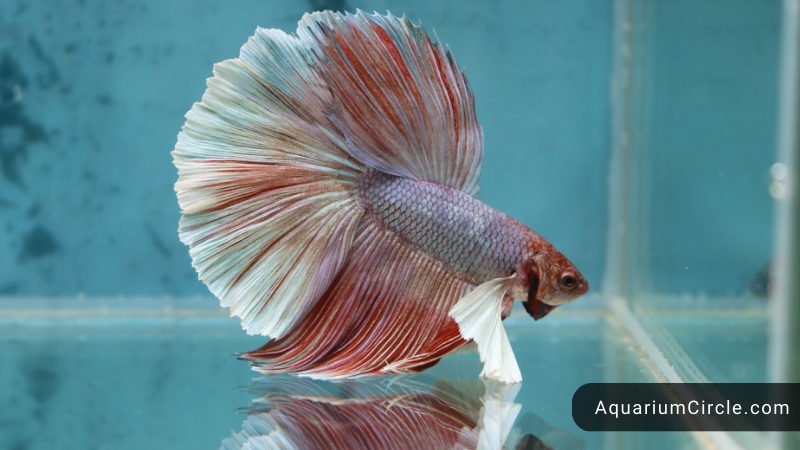
Provide a spacious and clean tank
Betta fish need ample space to swim around, explore their environment, and establish their territory. A tank size of at least 5 gallons is recommended for a single Betta fish. It’s also essential to maintain a clean fish tank by performing regular water changes (at least once a week) and removing any uneaten food or debris. This will help prevent the buildup of harmful toxins that can make your Betta fish sick.
Keep the water temperature between 75-80°F
Betta fish are tropical fish and need to be kept in warm water to thrive. The ideal water temperature for Betta fish is between 75-80°F, so it’s important to use a reliable thermometer to monitor the water temperature regularly. You can use a heater to maintain a consistent water temperature, but make sure to choose a heater that is appropriate for the size of your tank.
Use a gentle filter to maintain water quality
A filter can help maintain water quality by removing debris and harmful toxins. However, it’s essential to use a gentle filter that does not create too much water flow, as Betta fish prefer calm water. A sponge filter is a good option for Betta fish as it provides gentle filtration without creating a strong water current.
Offer a varied diet
Betta fish are carnivores and need a protein-rich diet to thrive. Offer a variety of high-quality Betta fish pellets, frozen or live foods, and occasional treats like bloodworms or brine shrimp. It’s important not to overfeed your Betta fish, as this can lead to health problems and a dirty tank.
Add plants and hiding places for stimulation
Betta fish enjoy having hiding spots and plants to swim around and explore. Adding live or artificial plants and ornaments with hiding spots can provide stimulation and enrichment for your Betta fish. Plants also help maintain water quality by absorbing nitrates and other harmful chemicals.
See also: Betta Fish Plants: 17 Best Plants For Betta Fish
Avoid overfeeding and overcrowding
Overfeeding can lead to health problems and a dirty tank, so it’s important to feed your Betta fish small amounts of food 2-3 times a day. Additionally, Betta fish are solitary creatures and prefer to live alone in their own tank, so it’s essential to avoid overcrowding or adding other fish to the tank. Overcrowding can lead to stress, aggression, and even fighting among fish.
By following these tips, you can provide your Betta fish with a comfortable and thriving environment that will help it live its best life.
Video About Signs Of A Happy Betta Fish
FAQs
What is a betta fish?
Betta fish, also known as Siamese fighting fish, are popular aquarium fish known for their striking colors and long, flowing fins.
How can you tell if your betta fish is happy?
A happy betta fish will display active and energetic swimming, bright and vibrant colors, a healthy appetite, flaring fins and gills, and building bubble nests.
What are the signs of an unhappy betta fish?
An unhappy betta fish will display lethargic and inactive swimming, faded or dull colors, loss of appetite, clamped fins, and resting on the bottom of the tank.
What can I do to keep my betta fish happy?
To keep your betta fish happy, you should provide a spacious and clean tank, keep the water temperature between 75-80°F, use a gentle filter to maintain water quality, offer a varied diet, add plants and hiding places for stimulation, and avoid overfeeding and overcrowding.
How often should I feed my betta fish?
You should feed your betta fish small amounts of food 2-3 times a day. Overfeeding can lead to health problems and a dirty tank.
References

Annette M. Chaney is an experienced marine biologist with over 20 years of experience as an aquarist and fishkeeper. She started her first aquarium at a young age, filling it with frogs and goldfish obtained from the ten-cent pet store.
Annette grew up caring for and breeding African Cichlids, which led to a hobby in high school that doubled as a profitable means. Attending Reed College gave her time to solidify herself as an accomplished aquarium caretaker with an eye for sales. After that, from 2009 – 2013, she studied at Roger Williams University – one of the most prestigious universities for Aquaculture and Aquarium in USA. She is the founder of AquariumCircle since 2010.
